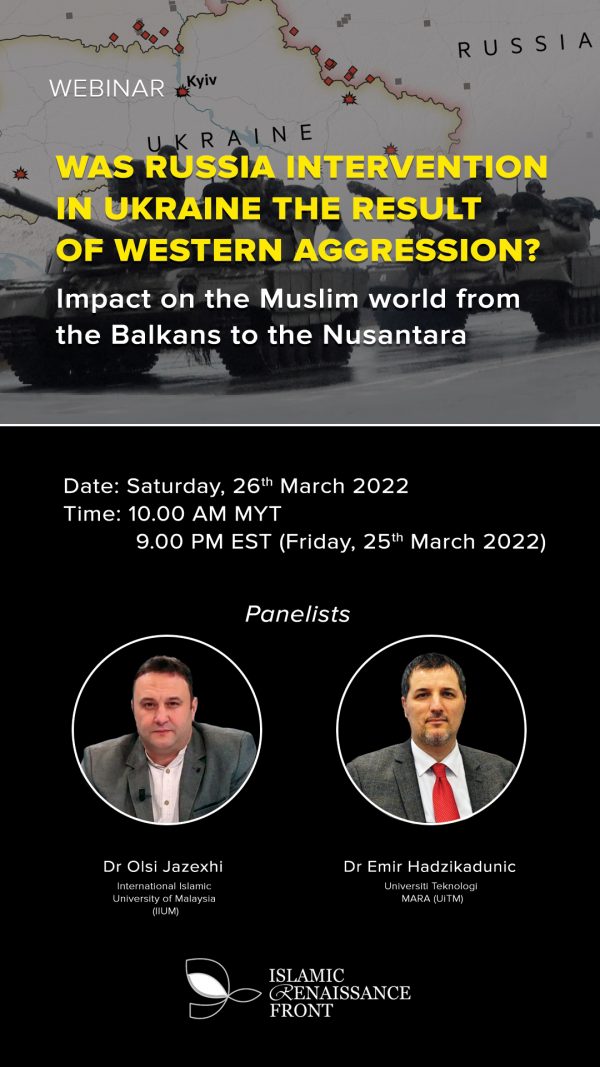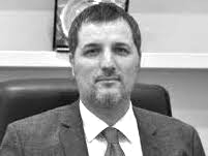
Date: Saturday, 26th March 2022
Time: 10AM MYT || 9PM EST (Friday, 25th March 2022)
Panelists:
Dr Olsi Jazexhi, Kulliyah of Islamic Revealed Knowledge, Department of History, International Islamic University of Malaysia (IIUM)
Dr Emir Hadzikadunic, The Faculty of Administrative Science and Policy Studies, Universiti Teknologi MARA (UiTM)
Moderator:
Nageeb Gounjaria, Senior Research Fellow, Islamic Renaissance Front (IRF)
Register at: https://www.eventbrite.com/e/was-russia-intervention-in-ukraine-the-result-of-western-aggression-tickets-298829325557
*The Zoom link for the Webinar will be sent to your email on Friday, 25th March 2022. You are welcome to join the chat during the webinar. You can also send your questions in advance to [email protected]
Ukraine was a cornerstone of the Soviet Union, the archrival of the United States during the Cold War. They share strong familial bonds that go back centuries. Kyiv, Ukraine’s capital, is sometimes referred to as “the mother of Russian cities”. It was in Kyiv in the eighth and ninth centuries that Christianity was brought from Byzantium to the Slavic peoples. And it was Christianity that served as the anchor for Kievan Rus, the early Slavic state from which modern Russians, Ukrainians, and Belarussians draw their lineage.
But Western scholars disagree somewhat on the motivations behind Russia’s aggression in Ukraine. Some emphasize NATO’s post-Cold War expansion, which Russia has viewed with increasing alarm. In 2004, NATO added seven members, its fifth expansion and largest one to date, including the former Soviet Baltic republics Estonia, Latvia, and Lithuania. Four years later, when NATO declared its intent to bring Ukraine and Georgia into the fold at some point in the future, Russia made clear a redline had been crossed.
Other experts dispute that Russia’s fear of NATO was its primary motive, countering that the NATO expansion question had largely dissolved after 2008 as Western governments lost interest and Russia increased its influence in Ukraine. Rather, they say, the biggest factor behind Russia’s intervention was Putin’s fear of losing power at home, particularly after historic anti-government protests erupted in Russia in late 2011. Putin claimed U.S. actors were sowing this unrest and thereafter began casting the United States as an archenemy to rally his political base. It was by looking through this Cold War redux lens that he chose to intervene in Ukraine, they say.
But we should not forget that the Former U.S. National Security Advisor Zbigniew Brzezinski, in early 1994, described a healthy and stable Ukraine as a critical counterweight to Russia and the lynchpin of what he advocated should be the new U.S. grand strategy after the Cold War. “It cannot be stressed strongly enough that without Ukraine, Russia ceases to be an empire, but with Ukraine suborned and then subordinated, Russia automatically becomes an empire,” he wrote.
With this background, this webinar that features experts in history and international relations will debate and discuss about this geopolitical issue and whether it would have any social or political ramifications to this side of the world in general, and to the ummah in particular.
About the Speakers:
 Dr. Olsi Jazexhi is an Albanian-Canadian historian who teaches Russian history at the International Islamic University Malaysia. He has previously taught history at University of Durres and University of Elbasan in Albania. He is a social activist and an independent media critic, who consistently challenges the mainstream media narratives in Albania and Kosovo. Dr. Jazexhi is a regular guest commentator for Top Channel, Klan, News 24, MCN News and other major TV stations in Albania. He has been interviewed by Press TV in Iran, TRT World in Turkey, CBC News in Canada about issues that are related to China and the Middle East.
Dr. Olsi Jazexhi is an Albanian-Canadian historian who teaches Russian history at the International Islamic University Malaysia. He has previously taught history at University of Durres and University of Elbasan in Albania. He is a social activist and an independent media critic, who consistently challenges the mainstream media narratives in Albania and Kosovo. Dr. Jazexhi is a regular guest commentator for Top Channel, Klan, News 24, MCN News and other major TV stations in Albania. He has been interviewed by Press TV in Iran, TRT World in Turkey, CBC News in Canada about issues that are related to China and the Middle East.
 Dr. Emir Hadzikadunic was the Ambassador of Bosnia & Herzegovina to Malaysia. He holds a PhD in International Relations from the International University of Sarajevo. His extensive experience in international relations and foreign policy includes professional service as Ambassador of Bosnia and Herzegovina to the Islamic Republic of Iran (2010-2013) and Malaysia (2016-ongoing), lecturing and guest-lecturing at the International University of Sarajevo and other universities in South East Europe, Malaysia and Singapore. He has written for academic journals and media outlets, authored two books, and co-authored other publications. Throughout his professional career, he has also conducted consultancy work for EU, UNDP, OSCE and USAID during their peace building missions in Bosnia and Herzegovina. He is currently a Distinguished Fellow at Faculty of Administrative Science & Policy Studies, Universiti Teknologi MARA (UiTM) Malaysia, Adjunct Lecturer of International Relations at the University of Sarajevo School of Science and Technology (Bosnia-Herzegovina) and Visiting Fellow at Istanbul Ticaret University (Turkey).
Dr. Emir Hadzikadunic was the Ambassador of Bosnia & Herzegovina to Malaysia. He holds a PhD in International Relations from the International University of Sarajevo. His extensive experience in international relations and foreign policy includes professional service as Ambassador of Bosnia and Herzegovina to the Islamic Republic of Iran (2010-2013) and Malaysia (2016-ongoing), lecturing and guest-lecturing at the International University of Sarajevo and other universities in South East Europe, Malaysia and Singapore. He has written for academic journals and media outlets, authored two books, and co-authored other publications. Throughout his professional career, he has also conducted consultancy work for EU, UNDP, OSCE and USAID during their peace building missions in Bosnia and Herzegovina. He is currently a Distinguished Fellow at Faculty of Administrative Science & Policy Studies, Universiti Teknologi MARA (UiTM) Malaysia, Adjunct Lecturer of International Relations at the University of Sarajevo School of Science and Technology (Bosnia-Herzegovina) and Visiting Fellow at Istanbul Ticaret University (Turkey).
Program:
1000-1010AM: Introduction by the Moderator, Nageeb Gounjaria, Senior Research Fellow, Islamic Renaissance Front (IRF)
1010-1040AM: Presentation by Dr Olsi Jazexhi, Kulliyah of Islamic Revealed Knowledge, Department of History, International Islamic University of Malaysia (IIUM)
1040-1110AM: Presentation by Dr Emir Hadzikadunic, The Faculty of Administrative Science and Policy Studies, Universiti Teknologi MARA (UiTM) Malaysia
1110-1155AM: Discussion
1155-1200PM: Concluding remarks by the Moderator, Nageeb Gounjaria
Organized by: Islamic Renaissance Front

